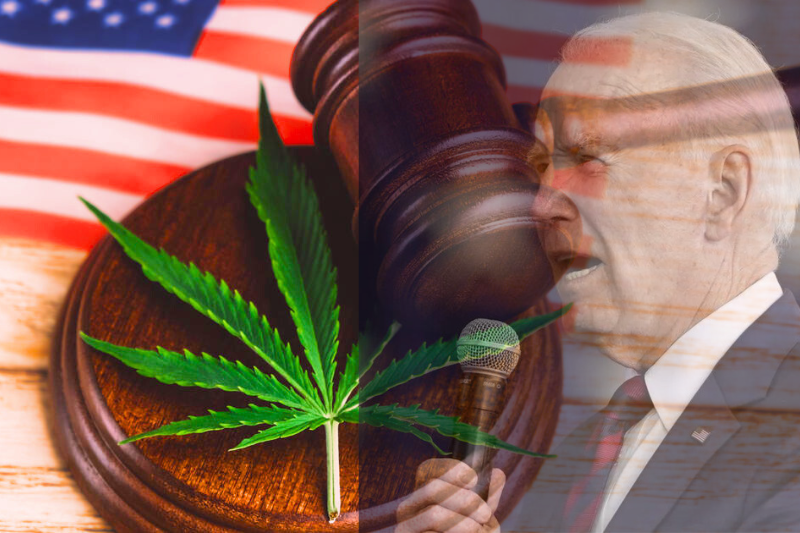
Biden’s Pardon Wave: Can It Transform the Landscape of Justice?
In a historic move aimed at rectifying racial disparities within the justice system, President Joe Biden has announced a sweeping pardon for thousands of individuals convicted of marijuana-related offenses on federal lands and in the District of Columbia. This executive action, disclosed by the White House on Friday, marks a significant step toward fulfilling the promise of equal justice, addressing the lingering impacts of the failed approach to marijuana. Biden’s Pardon Wave have the potential to redefine the very landscape of justice in the United States.
President Joe Biden’s Bold Move: Pardoning Marijuana Convictions
President Joe Biden’s categorical pardon follows a prior round of executive clemencies just before the 2022 midterm elections. The earlier round focused on individuals convicted of simple possession of federal lands, making them eligible for pardons. The latest action broadens the scope, including additional criminal offenses related to marijuana, thereby extending eligibility to an even larger population for expungement of their convictions.
Keep Reading
Addressing Racial Disparities
A key motivation behind these pardons is the aim to correct racial disparities prevalent in the justice system. President Biden, in a statement, emphasized that criminal records for marijuana use and possession have created unnecessary barriers to employment, housing, and educational opportunities. By offering pardons, the administration seeks to right these wrongs and provide a pathway for individuals to rebuild their lives without the burdens of past convictions.
Clemency for Nonviolent Drug Offenses
In addition to the marijuana-related pardons, President Biden is also granting clemency to 11 individuals serving what the White House has termed “disproportionately long” sentences for nonviolent drug offenses. This underscores the administration’s commitment to reforming the criminal justice system and addressing the harsh penalties associated with nonviolent drug convictions.
A Vision for Equal Justice
President Biden’s vision for equal justice resonates throughout this executive action. He believes that criminal records stemming from marijuana offenses have adversely affected lives, and it is high time to correct these societal imbalances. The president’s commitment to the expungement of these records reflects a broader effort to build a fairer and more equitable legal framework.
Limitations of the Pardon
It’s crucial to note that the pardon applies exclusively to marijuana offenses, and its impact is constrained by the federal stance on marijuana. While many states have decriminalized or legalized marijuana, it remains a controlled substance at the federal level. This dissonance highlights the ongoing debate surrounding the federal classification of marijuana and the need for regulatory adjustments.
Call to Action for Governors and Local Leaders
President Biden, in reiterating his call on governors and local leaders, emphasizes the need for concerted efforts to erase marijuana convictions at all levels. The intent is not only to address federal convictions but to extend this rectification to local jails and state prisons. The president contends that no one should be incarcerated solely due to the use or possession of marijuana, echoing a broader shift in societal attitudes toward drug offenses.
Submission Process for Pardon
Individuals eligible for this pardon can submit applications to the Justice Department’s pardon attorney office, which issues certificates of pardon. This formal process allows those with eligible convictions to initiate the steps needed to expunge their records and alleviate the burdens imposed by past legal troubles.
Looking Ahead
As the news of these pardons reverberates, it raises questions about the broader implications for drug policy in the United States. The administration’s support for reclassifying marijuana at the federal level indicates a willingness to reassess its status as a Schedule I controlled substance. This potential reevaluation could lead to a more nuanced approach to marijuana regulation, aligning federal policies with the evolving perspectives of many states.
From Pardons to Reform: Biden’s Vision for Equal Justice or Criminal Justice Reform
In conclusion, President Joe Biden’s pardoning of thousands convicted of marijuana charges marks a pivotal moment in criminal justice reform. The executive clemency demonstrates a commitment to dismantling the barriers created by outdated drug policies, especially those related to marijuana. As the nation grapples with evolving views on drug offenses, these pardons offer hope for affected individuals seeking a fresh start. President Biden’s call for collective action at all levels of government underscores the urgency of broader reforms and sets the stage for a more just and compassionate legal landscape.




